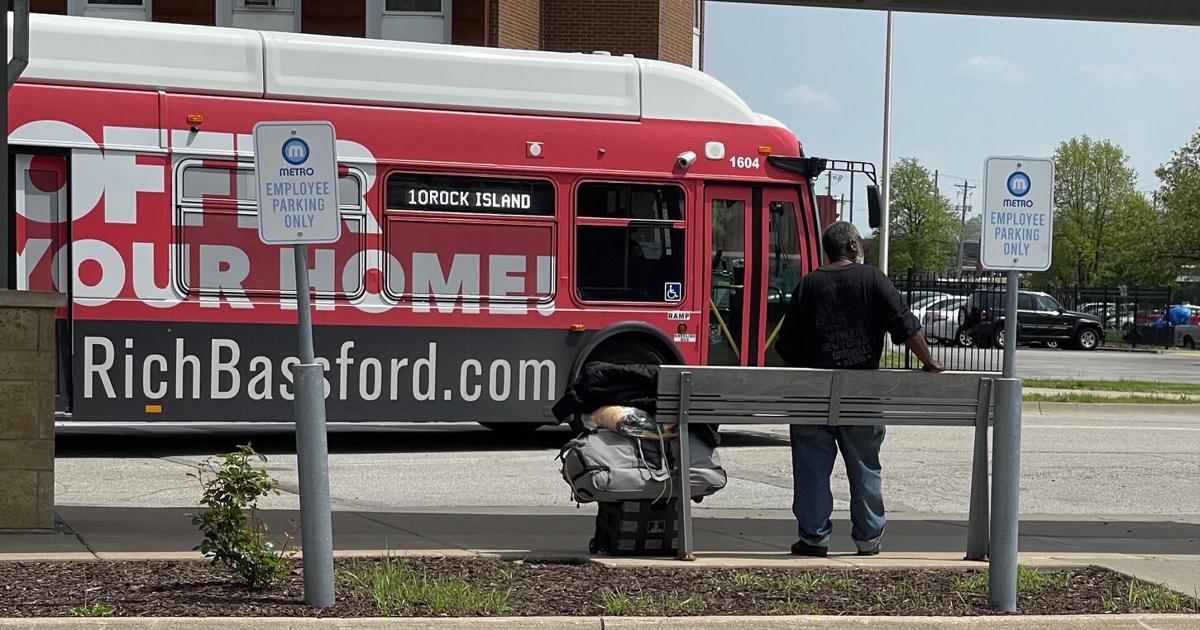
Destiny Lee Parker isn’t forced to have sex in exchange for a place to sleep anymore.
“I lived outside for three straight winters,” the blunt 40-something said in the late spring. “When I did get indoors, or got a hotel, it was because I was trading my body for it. I’m not ashamed of what I’ve done to survive, but people judge you. And it’s really dangerous. You get used a lot. You get ripped off.”
Lee Parker spent years on and off the streets throughout the Quad-Cities. She said she “got lucky for once” this past winter.
“I found the shelter in Rock Island this winter. I got some help there. For-real help,” she said. “They got me my Social Security card. They got me my ID (Illinois identification card). And they got me an apartment. I never thought I’d have my own apartment.”
The shelter Lee Parker found was Lift NOW, an emergency winter shelter made possible after Project NOW and Christian Care got permission from the city of Rock Island to temporarily convert Project NOW’s old location on 18th Street into a 37-bed overnight facility.
Project NOW pulled together $127,000 in funding, thanks to broad support. The city helped. The Rock Island County Board helped. The city of East Moline chipped in for the start-up costs. The shelter opened Jan. 17, just before one of the coldest weekends of the winter. It closed April 15.
Lee Parker said during the coldest times she spent every night at Lift NOW and the experience was a positive one.
But that is just part of a complex story of the winter shelter effort in Rock Island. Lift NOW’s presence, according to some, had a negative impact on the city’s efforts to revitalize the downtown.
Others said the shelter attracted people who could be threatening to those who live and work in the area.
Not long after the shelter opened, and to this day, Rock Island is a city grappling with how to balance the needs of small business owners in the downtown with those of residents who live in poverty.
Multiple sources said Rock Island City administration approached Project NOW and asked for the shelter to close before its official date of April 15. And in August, the Rock Island City Council voted to place a two-month moratorium on new facilities that serve homeless people and those in need.
The moratorium was put in place to allow the city council and staff time to develop new regulations and codes for nonprofit facilities looking to establish a brick-and-mortar presence in the downtown and throughout the city.
One Rock Island alderman said the decision to seek regulations and codes was a direct result of the negative perception of the Lift NOW shelter.
‘Some people have some pretty serious problems’
Lee Parker described the routine that developed for those who stayed in the Lift NOW shelter.
“On the coldest days, you could stay the night at the shelter, then I would go down to Project NOW in the morning and stay warm in there,” she said. “They let you in the shelter at, like, 9 at night, I think. And then you left the shelter at, like, 7 in the morning.
“You could go to Christian Care for breakfast in the morning, but then you might not get a seat over at Project NOW. Over at Project NOW they always had a TV to watch, even though there was no sound.”
Lee Parker said there were occasional fights at Lift NOW and there were individuals she avoided.
“It’s tough, because some people have some pretty serious problems — alcohol, drugs, just being crazy, you know,” she said. “I know some of the people downtown don’t like to see us. And maybe, sometimes, I can’t blame them.
“If someone is acting crazy, it might keep people from wanting to come downtown.”
Shop owners say homeless people disrupted business
While unhoused people like Lee Parker found a warm place to spend the night when Lift NOW was open, after the shelter was up and running a number of business owners in Rock Island’s downtown district spoke to city officials and Alderman Dylan Parker about what they saw as an influx of people disrupting their businesses.
Parker represents the city’s 5th Ward, which includes the area on 18th Street where the emergency winter shelter was located.
He stressed that it is not fair to assume every person on the street in the downtown district is unhoused. And he has repeatedly stated downtown Rock Island has been the home to shelters and service agencies geared toward helping the less fortunate for over 100 years. But, Parker said, people linked Lift NOW to an increase in people on the street during the winter months of 2025.
“There was a growing concern expressed about having people on the streets in front of businesses and people entering businesses,” Parker said. “It was a concern that businesses were suffering because of the increased presence of people living on the streets in the downtown.
“And, yes, the perception was that the emergency shelter brought more people into the downtown and those people were disruptive at times.”
Library dealt with more issues over the winter
Rock Island Library Director Angela Campbell added some perspective to the issue of unhoused people in the downtown. The downtown library is located on 19th Street, just across the street from where Lift NOW was established.
“First, you never know who is unhoused and who isn’t, so it’s not fair to make assumptions about where people live based on how they might look or act,” Campbell said. “Libraries are one of the places where people can go to to be safe, or warm in the cold, or cool in the heat. We have always had people come off the street and into the library.
“This winter we definitely dealt with more issues in the library. I don’t know if it was because of the emergency shelter — I’m not going to blame the shelter for bringing people into the downtown. I think it might have been a perfect storm of a number of things — less help for people, the SAFE-T Act which doesn’t allow for people to be detained so they are back out on the street, and extremely cold temperatures.”
Campbell said she and the library staff are actively training about trauma-informed care and striving to learn techniques to help library patrons who are in need of more than just traditional library services.
“What I really want for myself and my staff is learning how to be more kind,” she said. “I would like for us to learn how to be more comfortable asking questions. And I want my staff to be more aware of their own need for self-care. Some of the people who come in have very severe issues and it is sad, sometimes.
“Libraries are not just a place to find books. We have always been here to help people and we have to find new ways to do that.”
The perfect storm of circumstances that brought the increase of people to the streets of downtown Rock Island and forced the library to train staff also brought what Parker called “some trauma” to some business owners and downtown residents.
Project NOW says it tried to address concerns
Project NOW Chief Operating Officer Ron Lund said the agency tried to address concerns about the shelter and the people staying nights there. Lund said one issue for the agency and the community was the short amount of time Project NOW and Christian Care had to get the shelter ready.
“We missed an opportunity to work with our neighbors on what the shelter would look like. When this was brought to our attention by a local business our CEO (Dwight Ford) and COO (Lund) met with them,” Lund said. “A ‘Good Neighbors Initiative’ was started out of that first meeting, giving businesses the ability to contact senior leaders of Project NOW with any issues regarding homeless individuals with a 15-minute response time.”
Parker said business owners told him the initiative was not effective. He said business owners “walked away feeling worse off from those meetings” and Project NOW was not sensitive to the concerns of the people who live and work in the downtown.
Ford disagreed with Parker, who along with serving on the city council is a new member of Project NOW’s board.
“We had a positive experience working with three of the businesses that called us and had issues,” Ford said. “We were thanked for our response and we worked with those businesses.
“There was a fourth business where the owner was very upset, and then later called and explained and apologized and we at least got to hear one another. I don’t believe Dylan (Parker) is speaking for all the businesses downtown.”
After the shelter closed — and aware that the need for an emergency winter shelter would return — Parker said he wanted to start a discussion about regulations and ordinances that could balance the needs of the less fortunate with those of business owners and people who live in the downtown.
Parker proposed the council work with city staff to craft regulations guiding the establishment of social service agencies. He said city staff agreed and expressed the desire for a six-month moratorium on all new shelters, pantries and outreach centers.
City stops new facilities serving homeless until Oct. 13
In late August, the Rock Island City Council voted 6-1 to approve a moratorium on new facilities that serve homeless people and those in need. The council decided that instead of having the moratorium go through Nov. 24 as initially planned, it will last until Oct. 13.
The lone vote against the moratorium came from 3rd Ward Alderwoman Linda Barnes.
Fourth Ward Alderwoman Jenni Swanson said the experience of having Lift NOW in the downtown showed the city “some type of building ordinance is needed … to protect businesses and the nonprofit agencies.”
Swanson said the moratorium gives the city a chance to develop those standards “so that we could start to work in identifying what the zoning should be, what the description should be, what the licensing should be.”
Swanson expressed concern about the placement of nonprofits in the downtown and the need to make sure similar agencies are not competing for space. She also expressed the need “to set parameters” on how close shelters can be to businesses and schools.
The vast majority of the people who attended the city council meeting to speak during public comment did so against the moratorium.
Lund was critical of the moratorium and said the city is blaming a struggling downtown on people on its streets.
Lund says city blaming struggling downtown on homeless people
“The council believes it has a homeless problem downtown. It does not, it has a ‘no-one-is-downtown’ problem. Rock Island should be focused on its 1,900 vacant properties as there is a nationwide housing shortage,” Lund said. “In November 2024, a city-funded study stated Rock Island will build 11 new homes in the next 20 years. If there is no housing available, where do the homeless go?”
Lund said he thinks the city wants homeless people to find another place.
“I believe that some think the homeless will just leave if there are no services for them,” he said. “This is not the case and is quite frankly inhumane. Homelessness is a nationwide problem and won’t be solved by a moratorium.”
Parker said “there should not be good guys and bad guys here.”
“This is a needed discussion,” he said. “The city is trying to navigate these issues and be fair to as many interests as possible. We are not looking to get rid of shelters, we are simply trying to mitigate the impacts.”
Parker said he is frustrated with Lund and wonders if people realize the effect a nearby shelter can have on businesses in terms of increased expenses and security concerns.
Public-private partnership needed, Project NOW CEO says
Ford spoke out against the moratorium at the city council meeting in August. Earlier this week he said “regulations without relationships” are not effective.
“We could have all come to the table long before this and gotten as many perspectives as possible,” Ford said. “The city has said, on the record, that there are too many (social services) organizations in Rock Island … and they wanted to show a small number of businesses that they are doing ‘something.’
“So it appears there will be regulations done secretly with the insight of only a small portion of business community.”
Ford said there is a good reason why nonprofits have been established in the downtown.
“Nonprofits are helping the city,” Ford said. “Rock Island’s downtown reflects the people who live in that portion of the city, a city where the people who live downtown have a median income of 12,000 or 13,000 dollars a year.
Services go where they are needed
“The people who live in those areas often live in some form of poverty, so the services go to where they are needed.”
Ford checked through a partial list of the agencies headquartered in the city’s downtown and stressed those agencies should be seen as having a positive impact on the immediate area and the city as a whole.
“What are the agencies in the downtown? The YWCA and the plan for Alan’s House to help youths … Nest Cafe, where people can eat good food and pay what they can … Christian Care, the oldest agency helping the homeless in our area,” he said.
“The downtown is the headquarters for the Continuum of Care, which coordinates the efforts to end homelessness. We have a Downtown Alliance that works hard and has an outreach worker to help guide those living on the street. And the downtown has Project NOW.”
Ford said those agencies are assets for any city. He has consistently pointed out the nonprofits in the downtown bring dollars to the community’s economy and workers who visit the local businesses.
Ford said nonprofits could offer even more, if there is collaboration with the city.
“All of the nonprofits need the city’s partnership,” he said. “We want to play our part in growing a strong downtown and a strong Rock Island. The downtown can and will flourish.
“It will flourish when we have a strong public-private partnership. That’s the way to bring everyone to the table and find solutions. That’s the sign of a mature city.”
Daytime services for homeless in doubt
During a late September morning Christie Adamson was inside the storefront at 2000 Third Ave. in the heart of downtown Rock Island’s business district when two people got off a bus and stopped in to look through the coat racks at one end of the still-unfinished space set to be called The Third Place QC.
A few minutes later a man walked in. He was there to get help writing a resume.
Adamson and Cloey Miller founded The Third Place QC after working in directorial positions at the Davenport-based Humility Homes and Services, which offers housing, street outreach and other services to homeless residents. Adamson and Miller saw a need for daytime services for the growing population of unhoused and impoverished people in the Quad-Cities.
The Third Place QC was set to open in October. The space of approximately 2,600 square feet will provide services like laundry, secure charging ports for phones, rest areas, public restrooms, internet, hygiene supplies, clothing and secure places to store belongings. It will be open from 8 a.m. to 4 p.m. Monday through Friday.
The Third Place QC will not provide shelter, meals or street outreach, like some other nonprofits in the Quad-Cities.
“We’re not going to replicate what other services are already providing,” Adamson said. “People lack a consistent daytime space. Our effort is in really maintaining something that can be sustainable. We are looking to show people that they can be a part of a community.
“The Third Place is a place for people to come and be recognized, to feel safe, to know that they are wanted here.”
Adamson said she felt an urgency to help address the homelessness crisis in the Quad-Cities as she saw the number of unhoused people increasing over the past several years. The increase, she pointed out, has come at the same time Rock Island officials have attempted to renovate the downtown.
Adamson and Miller knew about what was happening at the downtown library and the kernel for the idea of The Third Place was born. They met with Campbell, other nonprofits and city officials.
Most importantly, they met the people out on the streets of Rock Island.
“We thought we were coming with a solution,” Adamson said. “We thought ‘Hot damn, we’re going to nail this.’ ”
Adamson said they got a dose of reality when they met with then-mayor Mike Thoms. She said they explained the concept of a daytime space for people to gather, and get access to some basic services.
“We want to be a place for businesses to send people,” Adamson explained. “We want to take pressure off the library, get people off the streets and in a place where they are welcome.
“Imagine not going for a job interview because you don’t have clean clothes. We will offer people a washer and a dryer. We will offer them a smile and a place to sit.”
Adamson said the reaction was negative.
“We were told to specifically to go to Moline,” Adamson said. “Literally the phrase ‘Not in my backyard’ was used. It was incredibly disheartening for the leader of the Rock Island community to not even want to hear what we planned.
“It was like the city didn’t want to hear solutions. We really were met with disdain for the project itself.”
Adamson said “It wasn’t until we met with (recently-elected Rock Island) Mayor (Ashley) Harris that we felt supported.”
Thoms confirmed the meeting and said he did ask Adamson and Miller if they considered locating in other cities.
“I am not against helping people and I’m not against having nonprofits in the downtown of Rock Island,” he said. “I will say yes, I was probably a little frustrated with the feeling that the downtown was being inundated with some nonprofits and it is very difficult to try and develop a district when nonprofits are taking up buildings.”
Thoms explained his concerns about the district’s tax base and efforts to attract new business.
“Project NOW moved right into a building in a location (1830 Second Ave.) we were trying to develop,” he explained. “I’m not against having Project NOW in the downtown, but we were watching nonprofits take property off our tax roles.”
Thoms said the moratorium was needed.
“We paused for vape shops and liquor licenses and gaming parlors,” he said. “The idea is to not get a concentration of one kind of an entity. Nonprofits are a sensitive issue, but I felt like there was a need for moderation.”
Thoms said he probably had discouraged the Third Place founders from the downtown location, but not their work.
“The city has spent $8.5 million trying to reinvent the downtown,” he added. “I think we have to listen to business owners. And we have to listen to the potential business owners who come to the district and see people on the street. I’m not saying those people are a danger, but it can be very intimidating.”
The Third Place QC was slated to open Oct. 1, 12 days before the end of the moratorium. That date is no longer certain. Swanson said an effort is being made to present the city council with the new regulations on Sept. 22, making the Oct. 1 opening possible.
“We don’t know if that will happen,” Adamson said.
‘Just one safe place’
Destiny Lee Parker offered her view of living without a home.
“Look around. Where do you go? When the weather is nice, you go to a park. When you’re downtown, maybe you go to the bus stop (the Metro QC in downtown Rock Island),” she said. “Go there right now and try to find a place to sit that isn’t a wall. They took out the bottom on all the benches.”
Lee Parker said the message is clear.
“You learn to be invisible because you are not wanted there,” she said. “I get it, too. Nobody wants to be around people who look bad or they are nodding (from drug use). Nobody wants to see someone sleeping on a bench.”
And she talked about safety.
“The thing you get in your head is you want just one safe place. It’s not just about danger. Most places aren’t dangerous,” she said. “You want a place you can go where they gotta place for you to sit. You wanna place where you don’t have to be invisible for a little while.
“If I didn’t go to that shelter, I wouldn’t have my ID. No one is a person to anyone else if you don’t have a way to prove it, right? If I didn’t go to that shelter, I wouldn’t have one place where I can go and be safe. Because you don’t wanna know what people will do just to have a bed or even a place to sit. You don’t ever wanna have to do those things.”
Love
1
Funny
0
Wow
0
Sad
0
Angry
0
Get Government & Politics updates in your inbox!
Stay up-to-date on the latest in local and national government and political topics with our newsletter.
* I understand and agree that registration on or use of this site constitutes agreement to its user agreement and privacy policy.
Tom Loewy
reporter/columnist
Get email notifications on {{subject}} daily!
Your notification has been saved.
There was a problem saving your notification.
{{description}}
Email notifications are only sent once a day, and only if there are new matching items.
Followed notifications
Please log in to use this feature
Log In
Don’t have an account? Sign Up Today



